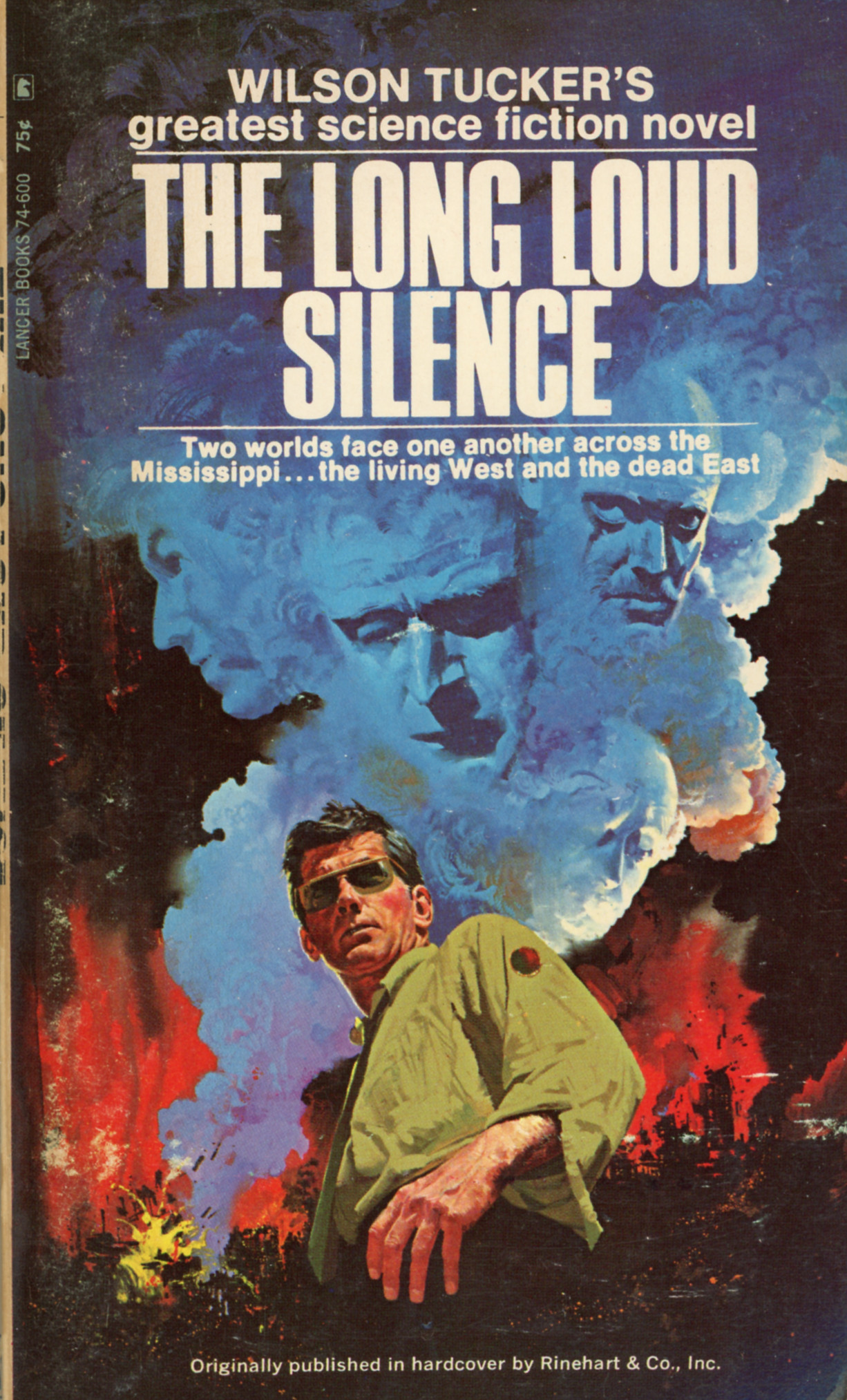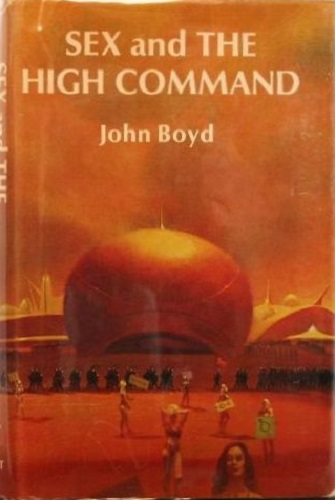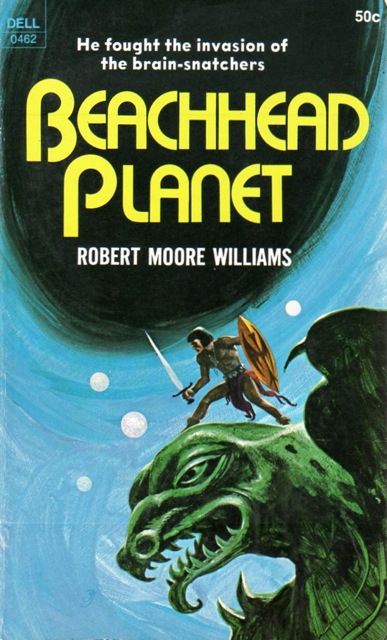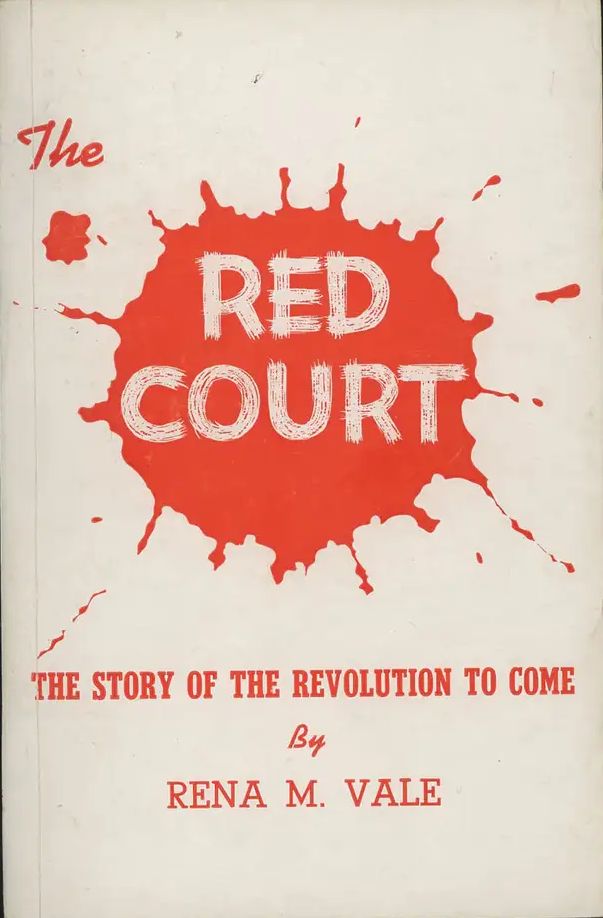[New to the Journey? Read this for a brief introduction!]

by Gideon Marcus
The Long Loud Silence, by Wilson Tucker

It's been a while since we've heard from Wilson Tucker, fan-turned-pro-but-still-very-much-a-fan. Hence, I was delighted to see that he had a new book out last month. Except, of course, it's not new at all, as I soon found out.
The story: Corporal Russell Gary, Fifth Army, veteran of "Viet Nam" and now Stateside on a recruiting stint, has gone on a bender for his 30th birthday. When he wakes up in a seedy motel room in a small town outside of Chicago, he finds that everyone in town is dead. Several days dead.
Turns out that some unnamed enemy has ravaged the American northeast with atomic fire and plague. Within 48 hours, almost everyone east of the Mississippi has died. West of the river, what's left of the country has set up a nationwide blockade, ensuring that the pestilence remains contained. No attempt is made to give succor to the thousands of Americans who have proven immune to the diseases.
Silence follows Gary as he braves the increasing barbarism until he can make his way back to civilization. Not a particularly bright nor sympathetic character, but with the instinct and training for survival, he partners up when convenient, kills without compunction when advantageous. He never becomes a brave hero or a romantic figure. Aside from a brief reference to New Orleans' straggling along, there are no enclaves of east-bank recovery. This is a holocaust from which no one is trying to rebuild. Just bands of increasingly hungry and desperate marauders, of which Gary is simply the one Tucker chooses to make his viewpoint.
There is no happy ending—indeed, there can't be. Gary is a disease carrier. The western United States has abandoned the east, and the east is a rotting corpse. And so, we have a story that starts like Andromeda Strain, continues like Alas, Babylon, and ends like a sour version of Spawn of the Death Machine.
Per the copyrights page, The Long Loud Silence originally came out in 1952, and was "specially revised and updated" for this release. That sparked my curiosity—how adroitly would Tucker handle the modernization? 17 years is a fair stretch, so it didn't seem like a slap of paint would be sufficient.
It wasn't. The story feels very much of its time (right around the time I got into science fiction, actually). There are no hippies, no reference to television. Lots of talk about radio and movies. The attack on the country is localized, believed to have been launched from Greenland…because ICBMs hadn't been invented yet. I'm pretty sure the Soviets now have missiles that can hit any part of the country. Certainly the new Russian bombers could hit Los Angeles as easily as New York. There's also a point in the book where a misprinted dogtag is an issue, and the implication is that it dates to the early 40s, which would match if Gary had been a WW2 war vet, which (having gotten a copy of the '52 release) it looks like he originally was. In fact, comparing the two versions, it looks like Gary's war background is the only change.
Setting that aside, and just reading "Europe" for "Viet Nam", how is the book? Well, it reads extremely well up through page 81. Gary teams up with interesting characters, including a fellow soldier/school-teacher, a jewel-mad girl named Irma, and a starving refugee named Sally. Seeing the ravaged geography and following the details of survival are compelling. The abortive probes of the Mississippi are exciting and tragic.
But after that, not only does Gary become more and more unlikable, but the author keeps repeating himself, copying whole passages from earlier in the book. The story just isn't long enough to need reminders like that.
I do appreciate that Tucker was willing to write an anti-hero, gritty and realistic. On the other hand, it means the narrative and the message of Silence is necessarily limited. The journey is interesting, but it doesn't say much other than that everyone is something of a bastard, civilized or otherwise.
Still, I actually finished the book, and quickly, which is more than I can say for the other two books I received last month.*
3.5 stars.
*The Yellow Fraction by Rex Gordon, is about a planet settled by a generation ship. There are three factions: the greens, espousing the terraforming of the world; the blues, espousing adaptation of humans to the world; the yellows, asserting that landing was a mistake. The yellows were right, but the totalitarian government doesn't want to hear about it. I lost interest around page 40.
*Star Giant, by Dorothy E. Skinkle, is about a seven foot humanoid alien genius who is exiled to Earth. It was too juvenile and silly for me.

by George Pritchard
Sex and the High Command, by John Boyd
I used to know a follower of Aleister Crowley, back in California. A little flighty and blustering, like most of his sect, but he told me something that’s stuck with me ever since:
“If you can't be good, be bad.”
That is a phrase that was in my mind throughout reading Sex and the High Command, the new novel by John Boyd. His last novel, The Rakehells of Heaven, was reviewed last year by Victoria Silverwolf. She described it as "an episode of Star Trek combined with a dirty and blasphemous joke." This novel is much the same, although it has far more dirty jokes than blasphemy. Dedicated “For Aristophanes and Lenny Bruce”.
Ugh. We haven’t even started the book and I’m already rolling my eyes.

by Paul Lehr
Our story follows Navy Captain Benjamin Hansen, captain of the UNS Chattahoochee, bringing his crew to Norfolk, VA, after eighteen months in Antarctica. But the docks are strangely peaceful…
It transpires that a peculiar new drug from California called Vita-Lerp is allowing women to orgasm without the involvement of a man. I have it on good authority that this is possible without drugs, but Vita-Lerp also allows for “self-childbirth” — women are able to reproduce independently, although it seems to result in no boy children being born to those women. Dr. "Mother" Carey, who developed Vita-Lerp, is also president of a movement called the FEMs, which has created cells through women’s meetings and book clubs. These cells have also taught the women “New Logic” and “New Grammar”, which puts a feminine ending on all masculine nouns, and has only female and “neuter” genders.
To help defend against the obsolescence of men, Captain Hansen is brought into the confidence of the highest offices of US power, as well as a crewman of his, Chief Water Tender McCormick. The latter has been chosen for President against Dr. Carey, as he is “Lothario X”, the ideal lover. In return, he asks for a wife of his own, one guaranteed to be “uncorrupted” by the FEMs movement. According to him, ”’I’m not particular, sir. I just want me some pretty little mountain doozy, not over eighteen, with a good shape, who can cook crackling bread.’”
(I’ve never understood that, the belief that women are most desirable when they’re teenagers. Everyone is so awkward and gangly, and pimply besides.)
A man named John Pope is sent to find the woman in question. He is a man’s man, and is the most likeable character in the book by a fair margin. However, not long after he completes his mission, Pope is killed by a prostitute and framed to look as if he died while having sex with another man. Is that the worst fate in the world? Is that the only context in which homosexual love can be imagined by this author?
It is discovered that Vita-Lerp may be used as a rectal suppository, and allows men to become women. The remaining men immediately accept the transformed person as "she” and a woman, an enlightened attitude which is surprising, given how stupid everything has been up to now. Speaking of which, Hansen is eventually taxidermied as an example of the now-extinct male species.
I have had real trouble writing this review, because I couldn’t decide how to go about it. Do I address it as science fiction? As a comedy? If the latter, what humor is there? If I am unable to understand the humor, what conclusions can I draw from the book itself?
”After the ceremony, Dr. Carey’s all-girl crew got the yacht away from the dock at Newport News with a minimum of scraped paint and the loss of only one bollard off the dock.”
Is this funny? I know that there is a stereotype of women not being able to drive well, but I think that is a matter of the limited practice time often afforded them. Beyond the plot’s suggestion of Lysistrata (a play by Aristophanes about women denying their warring husbands sex until they negotiate peace), there doesn’t seem to be much to suggest Aristophanes' wit, either.
The best thing I can say about this book is that it’s never boring. I always was interested in learning what happened next, no matter how stupid or silly.
If you can’t be good, be bad.
Two stars.

by Victoria Silverwolf
Don't Judge A Book By Its Cover

Cover art by Jack Gaughan.
Let's see; this sure looks like it's a sword-and-sorcery yarn, with a mighty-thewed hero and a dragon. Too bad that has nothing at all to do with what's between the covers. More false advertising, I'm afraid. Nevertheless, let's take a look inside and see what we've got.
Beachhead Planet, by Robert Moore William
We begin at an abandoned gold mine and ghost town that have been changed into a tourist attraction. A guy wearing nothing but a pair of torn shorts runs out of the mine. A ten-foot-tall monster with two heads blasts him with something that causes him to explode from the inside out. There's also a helicopter full of tourists, so old Two Heads blasts them, too.
That gets the reader's attention, anyway. We next meet our hero, a brilliant scientist who has a vast organization working for him. Among his employees are a guy who tells fortunes with a deck of cards and a woman who uses a crystal ball.
Why all this mystical stuff? It seems this guy also uses psychic methods to figure things out. He and his colleagues have a way of looking into their minds, kind of like mediation, and getting glimpses of the future.
Anyway, a military officer shows up and asks our hero to check things out at the site of the helicopter disaster. Heading for the same place, but separately, are two of his associates, a statuesque woman and a ape-like fellow.
(At this point, I was reminded of the old Doc Savage yarns that Bantam Books has been reprinting as slim paperbacks for the past few years. In a lot of ways, this new novel harks back to the pulp magazines of the 1930's.)
From this point on, the chapters alternate between the hero and his two pals. Suffice to say that they all get captured and wind up underground. Besides the two-headed monsters, we've got small robot miners and a bunch of kidnapped humans brainwashed by invisible aliens intent on taking over the world. Did I mention that there's also a Mad Scientist and his Beautiful Daughter?
At times, I thought the author was pulling my leg. There's a fair amount of teasing banter between the hero's two friends, and constant arguments between the monster's two heads. Then there's the scene in which the hero and the Beautiful Daughter keep their conversation secret from the aliens by speaking in Pig Latin . . .
This is a very silly book. Despite what I've said above, I can't really call it a satire or a comedy, because there's also some pretty gruesome violence. It's a quick read, and too goofy to be boring, but hardly worth slapping down four bits at your local drug store.
Two stars.

by Jason Sacks
Taurus Four, by Rena Vale
When writing reviews, it’s generally a good habit to separate the writer from the work. We reviewers have a responsibility to consider a book or story based on the quality of its writing, characterization and themes. We feel obligated not to fixate on a writer’s personal life nor on their political beliefs. Whether that creator supports Reagan or Brown, McCarthy or Nixon, is less important than their ability to write a compelling piece of fiction.
That’s true unless their personal life or political philosophy fuels their fiction – and most especially if that fiction is propaganda for that writer's philosophy.
Taurus Four by Rena Vale is a work of propaganda which shows the true colors of its author. This novel is sexist, pro-colonial, anti-Women’s Lib, anti-hippie, anti-Communist propaganda. Its author is one of the more repulsive creatures to be part of California’s political scene since World War II.
Those are strong words, I know, but please hear why I say them.
Rena Vale has been associated for many years with the work of the California Un-American Activities Committee (CUAC), even into the last decade. She has actively worked against the efforts of anti-War protesters, framed the questions the CUAC used to interrogate their witnesses, and painted the Free Speech Movement a communist plot.

Vale has the feeling of a zealot, because she was a convert away from Communism. During the 1930s, she briefly joined the Communist Party, attending meetings alongside luminaries as John Steinbeck, but she felt pushed out by sexist Party members. Vale believed Steinbeck’s research into The Grapes of Wrath demonstrated that the acclaimed author was looking to advocate communism. Vale even claimed that in 1936, while still dabbling with Communist Party membership, she attended a Party meeting at the home of Lucille Ball. Yes, Rena Vale believes Lucille Ball is a Communist.
Vale, in short, is a conspiracy theorist who sees an evil Communist around every corner and a traitorous subversive behind every anti-War protester. She tracked civil rights activists as early as 1963, cataloging the daily lives of members of the Ad Hoc Committee to End Racial Discrimination, the Berkeley Peace Center, the Free Speech Movement and other Northern California organizations into a massive compilation of detailed information which might have rivaled that of the national HUAC.
Thus Vale has a significant and long-lasting role in the anti-Communist crusade. That crusade led to loyalty oaths, repression of free speech, and to groups like the Hollywood Ten, skilled screenwriters whom studios denied employment (in fact, I'm reviewing the 'comeback' film for one of those blacklisted writers later this month. Ring Lardner Jr. is credited as the screenwriter of the new film M*A*S*H).
Vale is an avowed anti-Communist. She's a woman who makes her living through the organized and brutal oppression of those who disagree with her.
Vale believes science fiction can be used as propaganda to further her repugnant beliefs. And though science fiction has been used for propaganda since at least the days of H.G. Wells (see The Shape of Things to Come, among other works by him), authors must demonstrate some real grace to make that propaganda compelling.

Cover by Robert Foster. It has has absolutely nothing to do with the book.
There is little grace in Taurus Four. The propaganda is not compelling. I think this brief excerpt will give you a bit of an idea of why I was repulsed rather than compelled by the ideas in this novel.
To communicate, to permit one’s self to become involved emotionally with alien creatures, brought doubt of the total rightness of Earth and Mankind. Did the strong and virile men of the American old West (sic) ever doubt the rightness of white Yankees in pushing westward to the Pacific Ocean? Were there any among them who had the bad judgment to listen to the redman’s tale of woe? If so, history obliterated them. History recorded the words of the strong, not those of the weaklings who fell by the wayside.
Taurus Four is peppered with ideas and phrases like that fragment. At its base in her novel is the pessimistic thought – pessimistic to Vale anyway – that at the end of the Cold War, the Soviets “dictated fashion as well as many other social, political and scientific customs,” that Soviet supremacy “was accepted and [it] became a matter of historical record that the ‘bourgeois-capitalist’ countries were decadent, the people degenerating into pulpy softness.”
From that world we meet our protagonist, Dorian Frank XIV, a pudgy and henpecked 32-year-old “space sociologist” from that soft society who can’t even pilot his landing vessel correctly. Frank crash-lands his ship on Taurus Four, and rather than obey orders and stay close to his ship, Frank decides to wander off in search of food.
More concerned with protecting his tender feet and avoiding sunburns than with prudence, Dorian eventually finds himself in a strange village settled by descendants of 1960s San Francisco war protesters. Those people have gone wild in the 300 years since their ship landed on this distant world: living naked, not cutting their hair or nails, descending into a kind of pidgin English, and eating only fruit from the sacred “manna” tree. They are ruled by a cruel and despotic leader who orders sacrifices to a native god.
While most of the members of the tribe resemble American Indians, the chief’s daughter looks more European-descended: her “skin was almost white instead of the reddish tan of the others; her hair was fine and pale, muscles firm, stomach flat and breasts perfect.”
The girl, Teeda, is racially superior to her peers from a colonial standpoint, which helps cause Dorian to fall for her – despite the fact she’s just 14 years old. Yes, this girl has a man twice her age admiring her breasts (I feel a little sick just quoting that line). But that sexualization is all fine in the context of the novel because, well, the couple barely even kiss before Dorian is rescued. And even beyond that, Teela is hard-wired for the traditional work of women. Despite the fact she’s lived naked all her life, when asked to wash clothes she embraces the work: “I wash now. I think I do more better than you.’ He laughed. ‘It's instinctive I guess—something carried in the genes that makes women want to wash clothes!”

Frank adopts a paternalistic approach to Teeda – perhaps logical since she is practically young enough to be his daughter. But he also takes a paternalistic approach to the colonists, embracing a James T. Kirk-style approach to upending their peaceful life and introducing chaos and worry into a long-stable existence. Of course, this peaceful society embraced communal property, lack of individual rights, and a feverish devotion to their absolute monarch. All those attributes could be found in the Soviet Union, so by definition they are evil philosophies which must be destroyed.
Therefore Frank, quickly coming into his own as an aggressive man who has even lost his baby fat, is the logical man to redeem these primitive people. He grows into a true Colonial whose mission becomes the need to modernize the natives’ civilization. Frank won't listen to "the redman's tale of woe."
I’ve already written 1000 words on this essay, and I hope my points here are cogent. But I’d like to note one more thing: this book is just not well written.
Oh, sure, Vale is literate. Her sentences aren’t too long, and her settings are vivid enough. But she struggles badly with characterization, she writes a pathetically clichéd villain, and the details of this world are sketchy at best. Over and over, I found myself slightly compelled by a hint of gracefulness in Taurus Four, only to become overwhelmed by bland events of political grandstanding or a disgusting glimpse into her politics.
The book feels amateurish, like the work of someone who understands the mechanics of writing but has no idea of its skills. Since she is 72 years old, I don’t expect Rena Vale to improve.
This is not a good book, and I can’t recommend it. Furthermore, I don’t want Vale to receive another penny of anybody’s money.
1 star.
[New to the Journey? Read this for a brief introduction!]




Two elements interest me about the Tucker. I wonder how much of Gary's negative depiction was changed, modified, or accentuated in the rewrite. I think the post-WWII moment when the original was written (maybe we can stretch it and say Korean War as the novel appeared in the middle of the conflict although that would depend on how long it took to see print post-completion) is quite different than during Vietnam.
That is to say, Gary's depiction as "Not a particularly bright nor sympathetic character, but with the instinct and training for survival, he partners up when convenient, kills without compunction when advantageous" is what makes the story so subversive. WWII veterans tended to be depicted in more heroic stripes. It's a far more realistic depiction of the soldier who does not always act in a heroic manner. And it pokes holes in the American drive to rebuild and make better — as you point out, no one is really doing anything of the sort.
I loved how bleak this one was. It's so different than Alas, Babylon or some of Wylie's works as it does not suggest that nuclear war somehow magically will enable Americans to rebuild and make better. Pat Frank's depiction ends up perversely pining for destruction.
Thanks, Boaz! I never really got the impression that Frank was advocating for a purge and rebirth. More "this is the best we can hope for… let's not blow everything up, please."
I agree that Tucker absolutely accomplishes what he sets out to do, and I probably would have enjoyed it more had it stayed in 1953. It's a good book—I just prefer hopeful to bleak!
Yeah, Alas, Babylon is triumphalist in its very nature — it imagines true American values emerging on a new frontier in a post-racial South. Most of the people tied to the morality of the past die in the story. Those that survive embody a new generation of racially progressive independent Americans ready to make anew. That's a "perverse pining [perhaps indirect] for destruction."
…it's narratively set up to show that that change would never happen without the bomb. The main character retires from politics and enters a state of utter inaction before the bomb.
Or it's making lemonade out of strontium lemons!